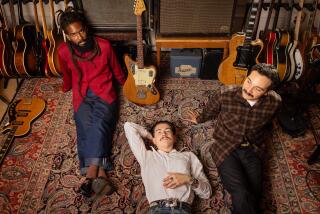Outside Insight
- Share via
SANTA ANA — Frankenstein’s monster may be the most completely human creature ever imagined, stitched as it was by human hands from human flesh.
By similar reasoning, Sebadoh is the most completely “alternative” alternative-rock band ever grooved into plastic or shuffled reluctantly into the spotlight.
The Massachusetts trio’s sometimes catchy, sometimes harshly clanging guitar-rock is like a compendium of the major strains in what might be called the “true alternative” sound--the style born with the Velvet Underground in the mid-’60s and reborn in the post-punk, collegiate-rock ‘80s.
“True alternative” is music by and for people who feel like round pegs that won’t fit into square holes, yet aren’t so angry as to want to destroy society’s peg board--as some punk rockers fancy themselves doing.
It’s an underdog form that’s too idiosyncratic and unpolished to scoop up a mass audience. (The creators of true alternative generally have been shy and gawky misfits, as opposed to the glamorous, attention-craving misfits the star machinery loves.) But at the same time, good true-alternative is too imbued with the fundamental, accessible rock virtues of catchy melodies and enlivening rhythms not to deserve a hearing by anyone who likes rock ‘n’ roll.
Today’s pervasive irony in rock is the product of true-alternative rockers’ contradictions: wanting to be widely heard but not willing to package music for the selling machine; wanting attention but not fame; feeling rebellious but being basically decent, educated people who like to get along with others; knowing they’ve got something to offer that many people would enjoy but also knowing that relatively few will get the chance.
Sebadoh, formed in 1989 during the waning days before true-alternative gave way to grunge-led “modern rock,” embodied the style’s sounds and psychic contradictions Wednesday night at the Galaxy Concert Theatre.
Like all the good true-alternative bands that stuck around a while (Sonic Youth, Minutemen, Husker Du, the Replacements, Meat Puppets, Throwing Muses), the prolific Sebadoh has moved toward accessibility and stronger production values.
Sebadoh has shed its old stance as a leader of the “low-fi” movement, which essentially meant recording music one cares about deeply as if one doesn’t care at all.
“Harmacy,” the band’s current release, could serve as a taste test for people who haven’t been exposed to true alternative. If you like all of it, chances are you’ll like all of the bands mentioned above, because “Harmacy,” like Dr. Frankenstein’s patchwork creation, incorporates limbs and organs lifted from them all.
*
What sets apart Lou Barlow, Sebadoh’s founder and main singer-songwriter, is his fondness for burrowing into plaintive, slow numbers that cast him as a true romantic, a man of deep, wounded feeling. From the bleeding heart on the humorous banner Sebadoh set up as a backdrop, to some of Barlow’s asides during the show, he got wryly ironic mileage out of his image as a contemporary Young Werther, the Goethe character so sensitive and sorrowful that he had no recourse but to kill himself.
Barlow has done a service, though, in giving sensitivity a place in a slam-dancing post-punk world where many think it unseemly to explore emotional terrain covered by the wimpy ‘70s soft-rockers the original punks hated. Tender, graceful Sebadoh songs such as “Too Pure” and “Willing to Wait” reclaim the quiet, lovely face that the frequently dissonant Velvets showed as they unwittingly founded alternative rock.
Sebadoh also grappled with its reputation for playing shows that are indifferent or even disastrous (another “true-alternative” characteristic inherited especially from the Replacements). Disaster beckoned early in the show when, after a fine start, Barlow quit mid-guitar-solo during the third song, “On Fire,” and inexplicably hurried off the stage.
*
After some cajoling and an apparent pep talk by the band’s roadie and buddy Michael Flood, Barlow made it through the rest of the show without any jitters. He implied that quitting during a song that was going along nicely had something to do with blahs from the cold he was suffering: “I should have taken more drugs today. More than Sudafed, anyway.”
Previously known for onstage diffidence and lethargy, Barlow, singer-bassist Jason Loewenstein and drummer Bob Fay now play their songs with respectable tightness and alertness. Barlow even strummed his guitar with a somewhat showman-like, albeit circumspect, approximation of a Townshend-esque windmill attack.
But given its true-alternative background, the band had to do something to defy rather than please the audience. It accomplished that with obnoxious recorded sound bites played during every pause--mainly snippets of commercials and braying announcers ironically hyping Sebadoh.
Loewenstein had his moments as a designated edgy howler lending contrast to Barlow’s gentleness. However, a long, uninterrupted sequence of his songs before the encore grew overbearing. A chunk of Barlow’s material also was same-sounding stuff that ran together with ordinary melodies and arrangements.
Still, the better half of Sebadoh’s concert repertoire, including “Ocean,” “Perfect Way,” “Not a Friend,” “Skull” and “Beauty of the Ride” (the latter two showing that Barlow can rock out while looking inward) were truly exemplary true-alternative.
Those Bastard Souls, the opening band fronted by Memphis-based rocker Dave Shouse, excelled sporadically when they played gritty, rumbling, unvarnished rock ‘n’ roll, notably “These Things Will Slay You Every Time,” in which all six members contributed to a fine clatter resembling a rickety freight train with brake failure.
More often, TBS got derailed trying to be arty as it deployed makeshift reed instruments made from rubber hosing, a dissonant violin and a noise-generating electronic console. Shouse carries the album, “Twentieth Century Chemical,” with a voice that sounds like John Lennon after a smoking binge. But on stage, his half-spoken delivery stopped channeling Lennon (except for a vaguely British accent) and added no spark.
More to Read
The biggest entertainment stories
Get our big stories about Hollywood, film, television, music, arts, culture and more right in your inbox as soon as they publish.
You may occasionally receive promotional content from the Los Angeles Times.











